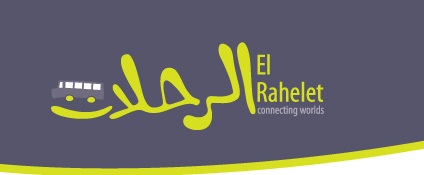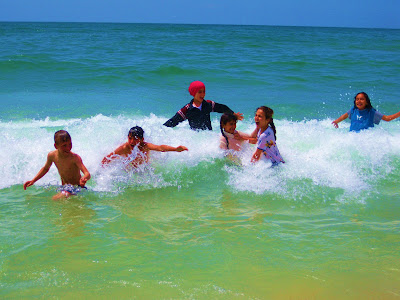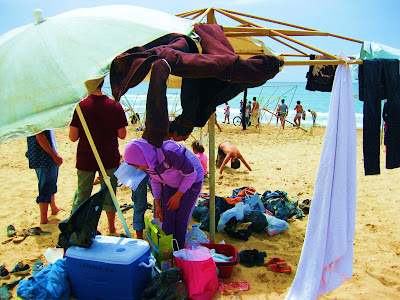Sunday - April 26 - 2009
Facilitators: Lina, Rana, Karim, Eli, Reem, Diana, Cindy
A few outings ago, with another camp, we had a child get sick and throw-up on the bus. I thought it was just a “one-off” and that this kid just ate something bad. However, on the trip today with this Nahr el Bared group, the same thing happened. This time, many kids got sick and threw-up.
What I’m beginning to discover is that this might not be a coincidence. Just as these kids are either frightful of, or think the escalator in the shopping mall is like a carnival ride, simply, they’re also not so used to bus rides, or car rides even…. or any type of fast-wheeled journey that brings them too far out of the camp region and into another community.
As I was unloading the pictures from this event off my camera, I noticed they were right next to my pictures from a trip I recently just got back from with a family here in Lebanon. I was their guest at Euro Disney in Paris. Apparently, I hadn’t gotten around to filing out these vacation pictures. Pictures of the Euro Disney grand castles, and the lavishness of Paris, were by chance, juxtaposed right next to these pictures of the Palestinian refugee children from the Nahr el Bared camp.
This vacation was a VIP holiday getaway, and we stayed at a more than extravagant hotel. We even had “VIP passes” so we didn’t have to wait in the lines at Euro Disney. The toilet bowls in our hotel suite had rose petals in them. And they left us chocolate coins on our pillows each evening. The kids I was in Paris with were, on my camera, right next to other children that can’t even stomach a bus ride - ones that hardly even get the opportunity to leave their refugee camp.
Something inside of me didn’t feel right.
I loved the little girls I was with in Euro Disney. And the family is a very sweet one – and very privileged. I had a fantastic time with them. However, observing their privilege now, on my camera, digitally adjacent to these Nahr el Bared kids at a public beach in Beirut, made me feel like I needed to get up and pace the room and just think about the two ends of a very long spectrum.
As I roamed back and forth, I started thinking. I finally quieted my mind from this unsettling duality, as I beautifully remembered:
On our outing today, one of our Nahr el Bared girls didn’t want to eat the sandwich we had provided for her for lunch. She peeled out the strips of turkey, held them up in the air, and looked at them as if they were inedible. She looked as though she was almost too good to eat this turkey and cheese sandwich Lina had prepared for her.
A bit later, Lina discovered that this girl didn’t even want to eat the chocolate Oreo cookies – as apparently even those weren’t up to her standard! I laughed inside when I noticed her princess-like attitude. And I was a bit baffled actually.
But at my “baffled-ness,” I caught myself – and ultimately, got angry with myself.
Baffled, why? Why should I expect her to like any sandwich given to her just because she’s a poor Palestinian refugee from Nahr el Bared? Why was I thinking like this? I felt myself ugly for even having such a thought.
Because this girl had nothing, lived in squalor, threw-up on the way over because she’s not used to busses, and not having much opportunity living in a war-torn refugee camp and had princess-like tendencies – I was confused. I was simply confused. I thought for sure she’d enjoy this or any other random sandwich – and not even think about how it tasted. How pathetic of me.
The more I thought about it, I began to sink and finally arrive into a liberating catharsis.
What I had newly discovered was that deep down inside of me I actually loved and rejoiced the fact that this little girl demonstrated an air of conceit. I loved that fact that this Nahr el Bared girl had princess-like tendencies. In fact, I began to wish that more of my refugee kids grew to be a bit more picky, choosey, and had certain expectations of what they did want and didn’t want in their sandwich - simply because - after finally coming to my senses - they have every right to be just as picky as anyone of us – regardless of their miserable circumstances.
Fancying my newly coveted conclusion, my imagination began to drift. I began dreaming up certain situations: There she was, 20 years older, on a date with a wealthy Lebanese man, demanding that she can only drink “sparkling” water, or that her lobster be sent back and cooked “properly.” I daydreamed about one of the boys, in his 30’s, going up to a hotel lobby reception and complaining that the toilet paper is too rough. As the sun continued to make my eyes squint, I closed them all the way, and dreamed of more fairy-tale fantasies for my refugee kids.
When I arrived back to the moment, I couldn’t hide my smile at her “air,” one such that of royalty.
I loved it.
I quickly scrambled and gave this princess a bag of salt and vinegar chips, which, I found out, apparently were up to her standard. She smiled at me and took the bag. My insides were jumping up and down.
I was so damn happy to discover that this girl has certain expectations, standards, and quality assurance measures for her food and other things in her life. And I pleaded in hope that she would have the same high standards and expectations for how others treated her - future employers she might have, and for a man she might marry. I wanted her to be just as picky, choosy, and stubborn as any other kid coming from privilege.
I always thought the world of these kids. And I loved catering to them as if they were royalty. But what I discovered today is that that even amidst my admiration for them, I still thought they, given their circumstances, should still be all okay with mediocrity. This is where I went wrong.
If, by some strange stroke of luck, I ever did get the chance to take these refugee kids to Euro Disney and Paris, the chocolate coins placed on their pillows better of be the finest Swiss chocolate.
Otherwise, the coins don’t belong there.














































